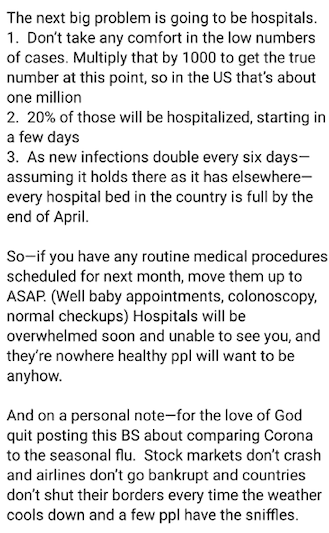You know what the most interesting thing is about Limbaugh’s COVID commentary? The fact that he was recently diagnosed with advanced lung cancer. It stands to reason, does it not, that a man who desperately needs the best experts and credentialed information in this season of his (possibly fading) life would see the value of expert testimony? But in my experience, this actually has little effect on people. My family tree is full of people who practically live in the hospital and eat prescriptions for breakfast, lunch, and dinner, but who are confident that Sean Hannity knows more about anything than any scientist, lawyer, or even theologian. The death of expertise is so nefarious precisely because it’s resistant to cognitive dissonance.
Prudence Is Not Panic

As regular readers know, I’ve taken a lot of criticism in these comments threads, especially from Trump supporters, for my alarmism on coronavirus over the past month or so. That’s fine — I’m a big boy. I do wish to point out, though, that the kinds of things we were talking about on this blog weeks ago are things that are now mainstream. If you took me seriously back then, you are much better prepared to weather what is upon us.
A reader wrote me last night:
I’m a regular reader in Baton Rouge and want to thank you for your early coverage of the coronavirus outbreak. Because of you we now have food and supplies for up to a month.
Being 62 years of age with hypertension I am in the high risk category and your information has been invaluable. My 83 year old mother (a recent widow) would not have been aware of the severity of this situation had it not been for you, either. We are now prepared for the “social distancing” phase. My mom will begin staying with us tomorrow and we don’t plan to leave but to visit family who are also socially distancing.
I am horrified by the lack of urgency by our public officials. My husband was to attend a Rotary Club meeting today where our governor was speaker. He decided not to attend because he’s been listening to health officials (and his wife) instead of politicians. The meeting went on and the governor spoke as planned. Later today the governor announced that the number of cases in Louisiana went from six to 13 overnight.
I’m afraid that we are headed down the same road as our Italian friends and the President’s speech tonight did nothing to allay my fears.
Please continue to inform us about this pandemic. I know that you’ve been accused of fear mongering, but I want you to know that you are the reason my mom will have a chance to survive this. God bless you.
I so appreciate that. There have been a couple of comments like that too today. I want to commend to all of you Peggy Noonan’s column today in the Wall Street Journal. She writes, in part:
I wrote in February that I believed the coronavirus will be bad, that it will have a bigger impact on America than we imagine, and that a lot of people will be exposed and a significant number endangered. I was beaten up a bit and fair enough—to make a prophecy is to summon animosity, especially when men are scared and especially when they see everything as political. My assertions were based on a long reading of history and a close reading of what had happened in China, then Italy.
Now it’s time to lose the two most famous phrases of the moment. One is “Don’t panic!” The other is “an abundance of caution.”
“Don’t panic” is what nervous, defensive people say when someone warns of coming trouble. They don’t want to hear it, so their message is “Don’t worry like a coward, be blithely unconcerned like a brave person.”
One way or another we’ve heard it a lot from administration people.
This is how I’ve experienced it:
“Captain, that appears to be an iceberg.” “Don’t panic, officer, full steam ahead.”
“Admiral, concentrating our entire fleet in one port seems tempting fate.” “We don’t need your alarmist fantasies, ensign.”
“We’re picking up increased chatter about an al Qaeda action.” “Your hand-wringing is duly noted.”
“Don’t panic,” in the current atmosphere, is a way of shutting up people who are using their imaginations as a protective tool. It’s an implication of cowardice by cowards.
As for “abundance of caution,” at this point, in a world-wide crisis, the cautions we must take aren’t abundant, they’re reasonable and realistic.
Reason and realism are good.
Read it all. When people make fun of you for having stocked up in preparation, send them this column. When John Bolton took over as Trump’s National Security Advisor in 2018, this is what happened:
The top White House official responsible for leading the U.S. response in the event of a deadly pandemic has left the administration, and the global health security team he oversaw has been disbanded under a reorganization by national security adviser John Bolton.
The abrupt departure of Rear Adm. Timothy Ziemer from the National Security Council means no senior administration official is now focused solely on global health security. Ziemer’s departure, along with the breakup of his team, comes at a time when many experts say the country is already underprepared for the increasing risks of a pandemic or bioterrorism attack.
Ziemer’s last day was Tuesday, the same day a new Ebola outbreak was declared in Congo. He is not being replaced.
More:
Collectively, warns Jeremy Konyndyk, who led foreign disaster assistance at the U.S. Agency for International Development during the Obama administration, “What this all adds up to is a potentially really concerning rollback of progress on U.S. health security preparedness.”
“It seems to actively unlearn the lessons we learned through very hard experience over the last 15 years,” said Konyndyk, now a senior policy fellow at the Center for Global Development. “These moves make us materially less safe. It’s inexplicable.”
The day before news of Ziemer’s exit became public, one of the officials on his team, Luciana Borio, director of medical and biodefense preparedness at the NSC, spoke at a symposium at Emory University to mark the 100th anniversary of the 1918 influenza pandemic. That event killed an estimated 50 million to 100 million people worldwide.
“The threat of pandemic flu is the number one health security concern,” she told the audience. “Are we ready to respond? I fear the answer is no.”
How does that decision look today? We now know that this White House’s failure of imagination left America vulnerable in the face of this pandemic. That’s a stain that is not coming off.
Don’t let the same kind of partisan-driven magical thinking prevent you from taking action to protect and defend your family. Today I was out getting a few more supplies, and engaged fellow shoppers, and store clerks, in discussion about their level of preparedness. Of those I talked to, only one had done any preparation at all. I didn’t get the impression that these were the kind of arrogant, Rush Limbaugh types who are bluffing their way through the fear. These seemed to be true low-information people who simply had not heard. They were visibly surprised when I told them about what public health officials have been telling us to do to get ready. These are exactly the kind of everyday folks who would likely have been reached had the White House six weeks ago actually “panicked” in the sense Peggy Noonan means.
Alan Jacobs has an interesting post about Rush Limbaugh’s moronic claims this week about how minor coronavirus is. His reader Samuel James posted this comment:
On the other hand, when people do come around, there’s no point in shaming them the way they may have shamed you:
There is a powerful temptation to dunk and shame those still in the “you’re freaking over nothing” camp. I’ve done it. But some people genuinely just are not there yet—but can come around if we talk to them like human beings. Hope, patience, talk one on one to those who need it. https://t.co/WZl5c2B01y
— Ari Schulman (@AriSchulman) March 13, 2020
UPDATE: A British reporter’s dispatch from Italy. Excerpts:
The first identifies herself as Martina, but I believe she is Martina Crivellari, an intensive care cardiac anaesthesiologist at the San Raffaele Hospital in Milan.
She said: “There are a lot of young people in our Intensive Care Units (ICUs) – our youngest is a 38-year-old who had had no comorbidities (underlying health problems).
“A lot of patients need help with breathing but there are not enough ventilators.
“They’ve told us that starting from now we’ll have to choose who to intubate – priority will go to the young or those without comorbidities.
“At Niguarda, the other big hospital in Milan, they are not intubating anyone over 60, which is really, really young.”
More:
She added: “This virus is so infectious that the only way to avoid a ‘massacre’ is to have the least number possible getting infected over the longest possible timescale.
“Right now, if we get 10,000 people in Italy in need of ventilators – when we only have 3,000 in the country – 7,000 people will die.
“Rome right now is like where Milan was 10 days ago. In 10 days there has been an incredible escalation.
“Lombardy, which has the best healthcare in the country, is collapsing, so I don’t dare to think what would happen in less efficient regions.
“We’ve had no critical cases among children but with children, viruses are much less aggressive – think chickenpox or measles.
“But the very young are crazy carriers.
“A child with no symptoms will go to visit its grandparents, and basically kill them. So it’s essential to avoid contact between them”.
And:
He added: “You have no idea how many young people are here, I mean even 20-year-olds with no underlying conditions, in need of assisted breathing because of horrible pneumonia.
Italy has the second-best health care system in the world, according to the WHO. The United States is ranked No. 37.
Please, read the whole thing. We need to steel ourselves for what’s ahead.
UPDATE.2: A friend of mine passes this along. It’s from a friend of hers who serves as a missionary in China, and who is trying to warn his friends and family back home about what to expect:
